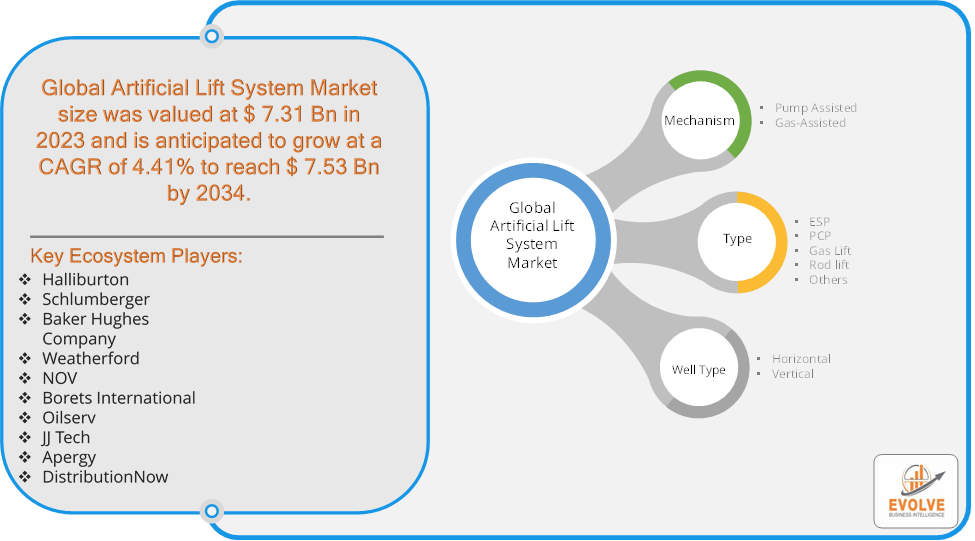Evolve Business Intelligence has published a research report on the Global Artificial Lift System Market, 2024–2034. The global Artificial Lift System Market is projected to exhibit a CAGR of around 4.41% during the forecast period of 2024 to 2034.
Evolve Business Intelligence has recognized the following companies as the key players in the global Artificial Lift System Market: Halliburton, Schlumberger, Baker Hughes Company, Weatherford, NOV, Borets International, Oilserv, JJ Tech, Apergy and Distribution Now.
The Global Artificial Lift System Market is projected to be valued at USD 7.53 Billion by 2034, recording a CAGR of around 4.41% during the forecast period. The Artificial Lift System Market refers to the industry focused on technologies and methods used to increase the flow of liquids, typically oil or water, from a production well. Artificial lift systems are employed when the natural pressure in the reservoir is insufficient to bring the oil or gas to the surface. These systems are critical in the oil and gas industry for maintaining and enhancing production efficiency, especially in mature fields or reservoirs with low-pressure conditions.
The market for artificial lift systems is driven by factors such as increasing demand for oil and gas, the need to optimize production from mature fields, and advancements in technology. As the industry continues to explore more challenging reservoirs, the importance of artificial lift systems will likely grow.
Segmental Analysis
The global Artificial Lift System Market has been segmented based on Mechanism, Type and Well Type.
Based on Mechanism, the Artificial Lift System Market is segmented into Pump Assisted and Gas-Assisted. The Pump Assisted segment is anticipated to dominate the market.
Based on Type, the global Artificial Lift System Market has been divided into ESP, PCP, Gas Lift, Rod lift and Others. The ESP segment is anticipated to dominate the market.
Based on Well Type, the global Artificial Lift System Market has been divided into Horizontal and Vertical. The Horizontal segment is anticipated to dominate the market.
Regional Analysis
The Artificial Lift System Market is divided into five regions: North America, Europe, Asia-Pacific, South America, and the Middle East, & Africa. North America is one of the largest markets for artificial lift systems, primarily driven by the U.S. shale oil boom and significant investments in unconventional oil production and Increasing focus on enhancing production in mature fields and deepwater exploration presents growth opportunities. The adoption of IoT and automation technologies is also on the rise. The European market for artificial lift systems is relatively smaller but is driven by offshore oil and gas production, especially in the North Sea and the focus on energy efficiency and sustainability, along with the need to optimize production from aging fields, supports the adoption of artificial lift technologies. The Asia-Pacific region is witnessing increasing oil and gas exploration activities, particularly in countries like China, India, and Indonesia and the market is gradually shifting towards ESPs and other artificial lift technologies to optimize production. The Middle East is a critical region for artificial lift systems due to its vast oil reserves and established production infrastructure and growing investments in enhanced oil recovery (EOR) and modernization of existing facilities drive demand. The region’s focus on maintaining production levels amid declining reservoir pressure presents opportunities for artificial lift systems and the African continent is emerging as a new frontier for oil and gas exploration, with countries like Nigeria, Angola, and Ghana leading the way.
